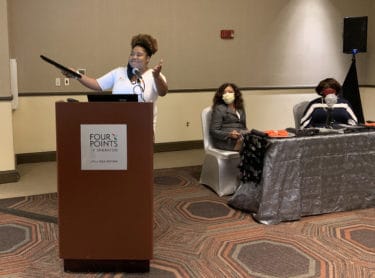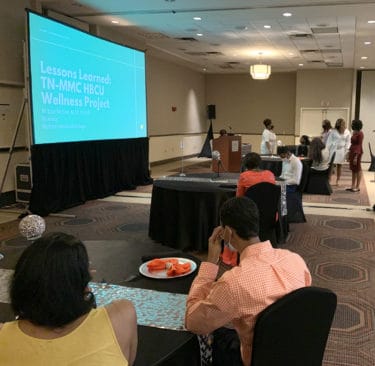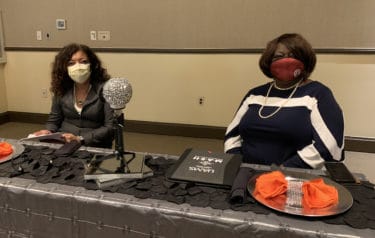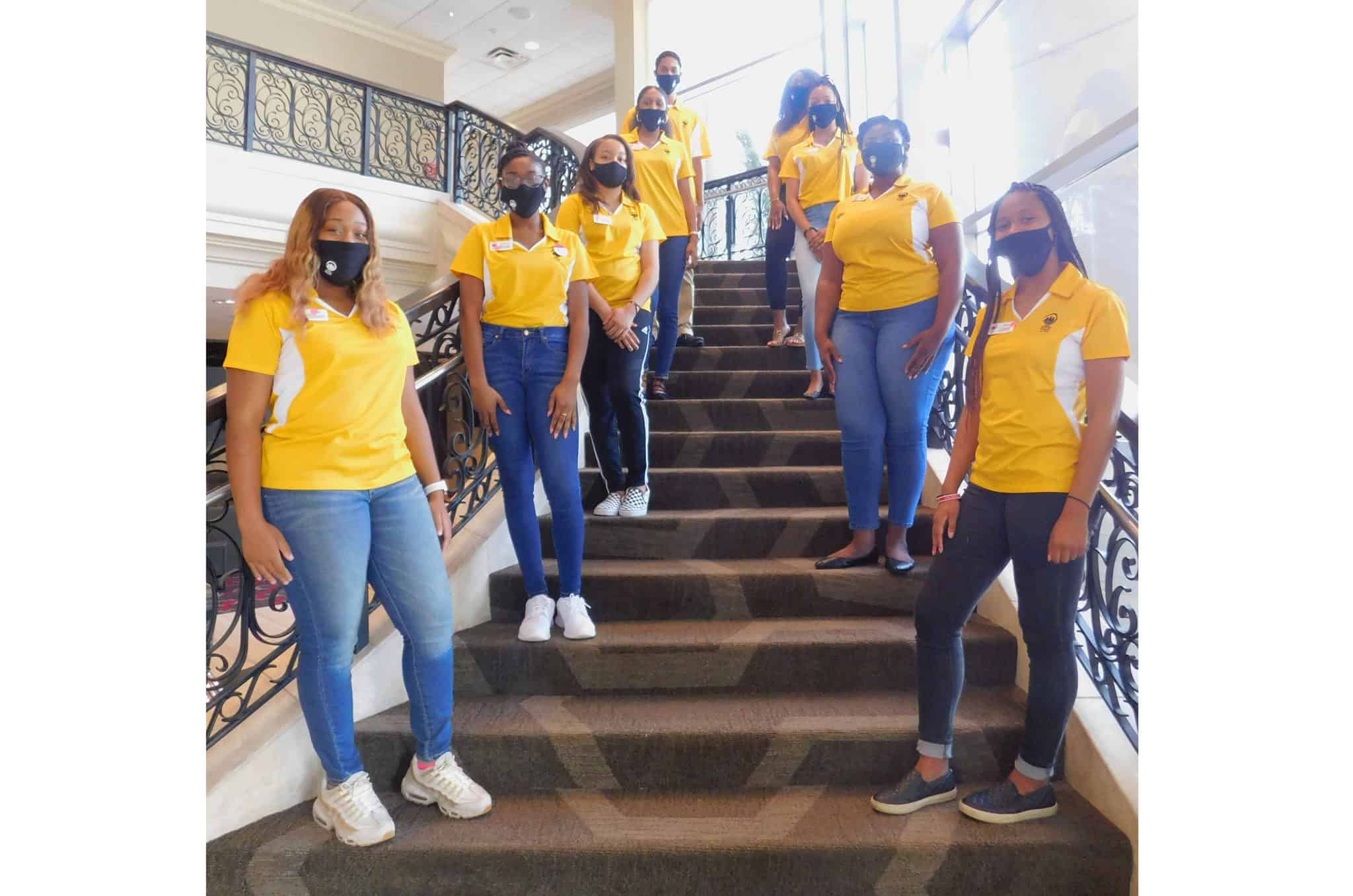SUPER Project Introduces Undergrads to Community-Based Research, Health Disparities
| Nine undergraduate students attended the SUPER Project Summer Institute in community-based research and health disparities in early August to prepare for health careers where they hope to make a difference in underserved communities.
This allows them to conduct research with the guidance of mentors at their home institution and at UAMS as part of SUPER (Serving Underrepresented Populations through Engagement and Research) Project.
SUPER Project is part of the UAMS HBCU Med Track program, which partners with historically black colleges and universities in the state to guide more students from minority communities into the medical field.
 “We give them a crash course on what is research and what are underserved communities and health disparities, to these are the steps you need to take to start a research project and this is what the IRB (Institutional Review Board) does,” said Renisha Ward, education coordinator of the HBCU Med Track program at UAMS. “They walk out of that institute ready to start their research the next day. It truly is a crash course in everything they need to know.”
“We give them a crash course on what is research and what are underserved communities and health disparities, to these are the steps you need to take to start a research project and this is what the IRB (Institutional Review Board) does,” said Renisha Ward, education coordinator of the HBCU Med Track program at UAMS. “They walk out of that institute ready to start their research the next day. It truly is a crash course in everything they need to know.”
The students will present their findings at research showcases in Arkansas, including at UAMS, but Ward hopes the students will be able to present at the 2021 Xavier University Health Disparities Conference in New Orleans.
UAMS HBCU Med Track collaborates with the University of Arkansas at Pine Bluff (UAPB) and Philander Smith College in Little Rock, with the hope to add additional partners in the future. Its aim is to train young underrepresented minority students from Arkansas who represent and understand its wide diversity, so they can stay in Arkansas, treat underserved communities in the state, and lessen the impact of an ongoing rural and underrepresented minority student physician shortage that is only expected to worsen in the coming decades.
 As part of the Summer Institute, the students heard from UAMS faculty from a variety of programs such as the College of Public Health, Department of Diversity, Equity and Inclusion, College of Pharmacy, Translational Research Institute, College of Medicine and the Graduate School.
As part of the Summer Institute, the students heard from UAMS faculty from a variety of programs such as the College of Public Health, Department of Diversity, Equity and Inclusion, College of Pharmacy, Translational Research Institute, College of Medicine and the Graduate School.
“We are truly rolling out the UAMS welcome mat for these students from the HBCUs. UAMS can seem like a big and confusing place from the outside world,” Ward said. “Now these students know more about what we do here, and they can identify someone personally in each field they can reach out to when they need help. It was like we opened the door and said, ‘come on in,’ and in the process, we exposed and educated them to many more health care careers and opportunities they may not have even known existed.”
Health disparities are differences in the health of one population compared to another because of barriers to adequate health care, such as race, socioeconomic status, geography, age, and language barrier.
 In Arkansas, researchers measure health disparities looking at the number of doctors and hospital beds per capita, incidence of elder and child abuse, access to fresh fruits and vegetables, access to health screening and preventive care. Other indicators include rates of obesity, diabetes, heart disease, cancer, mental health conditions, infant and maternal mortality, teen suicide, and deaths from violence.
In Arkansas, researchers measure health disparities looking at the number of doctors and hospital beds per capita, incidence of elder and child abuse, access to fresh fruits and vegetables, access to health screening and preventive care. Other indicators include rates of obesity, diabetes, heart disease, cancer, mental health conditions, infant and maternal mortality, teen suicide, and deaths from violence.
Many students come into the program knowing they want to go into some sort of medical career. Ward hopes each will grow from that starting point to aim even higher for themselves than they may have originally thought possible.
“By teaching them how to conduct research, we strengthen the student’s background so when they go to apply for those advanced degrees, whatever they end up choosing, they’ll be prepared to reach for the stars,” Ward said. “And of course, our ultimate goal is for them to become successful in their careers. They come from backgrounds where they will have a better understanding of how health disparities can have an impact on a community. We give them tools to understand those issues and see how they can make a difference in the lives of their communities.”
If the students continue their education at UAMS, they will find mentorship and guidance through the application process and their entire academic journey via the HBCU Med Track program. The project is meant to dovetail with other UAMS programs that target younger and older students to create a more seamless pipeline for underrepresented groups to enter health care careers.
At UAMS, the HBCU Med Track program is one part of the larger Arkansas Medical Education Primary Care Partnership, a project of the UAMS College of Medicine, UAMS Regional Campuses across the state, and the UAMS Department of Family & Preventive Medicine.
Program director is Christopher T. Westfall, M.D., UAMS executive vice chancellor and College of Medicine dean. He is assisted by co-directors Marcia Byers, Ph.D., director of clinical innovation for UAMS Regional Campuses; Daniel Knight, M.D., associate professor of Family & Preventive Medicine; and Leslie Stone, M.D., M.P.H., director of Medical Student Education for the Department of Family & Preventive Medicine.
Site directors are biology Professor Cynthia Burroughs, Ph.D., at Philander Smith, and biology Assistant Professor Sederick C. Rice, Ph.D., at UAPB.
Speakers for the Summer Institute included, keynote Daniel Dawes, J.D., of Morehouse College of Medicine, who wrote the book, “ The Political Determinants of Health;” keynote Lisa McGee, M.Ed., who pioneered the HBCU Wellness Project at Meharry College of Medicine that inspired the SUPER Project.
Speakers from UAMS were Westfall; Brooke Montgomery, Ph.D., M.P.H.; Kristy Caldwell-Jones, M.P.H.; Pebbles Fagan, Ph.D.; Gloria Richard-Davis, M.D.; Brian Gittens, Ed.D., M.P.A.; William “Sam” Greenfield, M.D.; Darri Scalzo; Pamela Killebrew; Lanita White, Pharm.D.; Kate Stewart, M.D., M.P.H.; Kristen Sterba, Ph.D.; Michael “Charles” Bailey; Anna Huff-Davis; Sharon Sanders; M.P.H.; Diane Jarrett, Ed.D.; LaShannon Spencer; Amber Booth-McCoy; Tremaine Williams, Ed.D.; Amy Wenger; Alexia Davis; Willie Hicks; Grover Miller, Ph.D.; LaTaaka Harvey, M.Ed.; LaShannon Spencer; and Micah Hester, Ph.D.
Student leaders and staff for the project included Amanda Winston, Hunter Black, Chandler Wilson, Xavius Hymes and Bailey Singleton. In addition, there are many UAMS faculty who are serving as research mentors. The UAMS mentors include: Nakita Heard, Ph.D., M.P.H.; Tremaine Williams, Ed.D.; Clare Brown, Ph.D.; Antino Allen, Ph.D.; Grover Miller, Ph.D.; Kristy Caldwell, Dr.P.H, M.P.H.; and Alan Diekman, Ph.D. The Philander Smith College and UAPB mentors are: Traci Hudson, Ph.D.; Joy Jackson, Ph.D.; Alexis Davis, Ph.D.; Zeeshan Habeeb, Ph.D.; Sharon Sanders, Ph.D.; Jocelyn Moore, Ph.D.; Anthonya Cooper, Ph.D.; Dr. P. Kelley, and Mohammrd Moshed, Ph.D.
